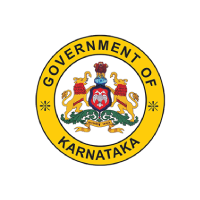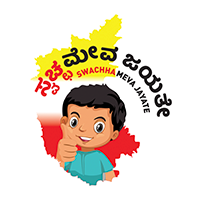Rural Sanitation in Karnataka:
Open Defecation has been a common issue especially in rural India. Historically, it wasn’t considered a shame or looked at from a sanitary perspective. Over the past few decades, Karnataka has seen the implementation of various sanitation projects under centrally sponsored schemes, externally aided programs and Government of Karnataka sponsored programs such as Nirmal Grama Yojane, Swachha Grama Yojane, etc. According to the Baseline Survey of 2012, out of 70.32 lakh rural households in Karnataka, 35% households had toilets, while the majority 65% were without toilets. To achieve the desired goal of accelerating sanitation coverage across rural India, “Swachh Bharat Mission” was launched on 2nd October 2014 by the Government of India. From 2nd October 2014 to 19th November 2018, 48 lakh Individual Household Latrines (IHHLs) were constructed across the state.
Swachh Bharat Mission (Gramin)
With an objective to give more focus towards rural sanitation, central government rewarded scheme Sampoorna Swachhata Andolan was implemented from 2005 to March 2012, and Nirmal Bharat Abhiyan was implemented from April 2012 to 2nd October 2014 in all 30 districts of the state. Later Nirmal Bharat Abhiyan was renamed and restructured as Swachh Bharat Mission (SBM) Gramin, and was implemented on 2nd October 2014. Phase 1 of SBM Gramin prevailed from 2014 to 2020. Now, SBMG Karnataka Phase 2 is in process.
Every household, school and anganwadi should have a toilet and it should be accessible. Everyone must use toilets instead of open defecation. It should be maintained well. Roads and lanes must be clean. Solid-liquid waste management is also one of the main objectives of this mission. Overall, SBMG Karnataka is working towards implementing activities to bring in total sanitation in all villages.
Objectives of SBM (G) Karnataka:
- To bring awareness amongst rural people on the need for sanitation through hygiene awareness and health education
- To create the necessity for cleaner environment
- To encourage all rural households to construct and use toilets
- Promote personal hygiene, cleanliness at household level and community cleanliness and thereby improve the quality of life of rural people
- Establishment of sanitary facilities in all schools and anganwadis in the villages and bringing in sanitation practices among children.
- The main objective of the Swachh Bharat Mission Gramin Karnataka Program is to achieve total sanitation in the entire rural environment by encouraging proper waste disposal and management at the village and community level.

Phase 1:
Rural India have never considered Open Defecation as embarrassing or a wrong practice. Over the past few decades several personal hygiene and sanitation oriented schemes have been introduced which have improved the awareness towards the same in rural people.
Defecating in the open leads to many fatal diseases. It causes mortalities of children within 5 years old, contamination of ground water and water bodies, financial loss due to health problems and affects the dignity of a person. Swachh Bharat Mission (SBM) Gramin was launched on 2nd October 2014 to eradicate open defecation, and to dispose human excreta in a safe and scientific way by encouraging the use of toilet and personal hygiene.
SBM Karnataka Phase-1 was aiming at making Rural Karnataka open defecation free. This scheme was implemented between 2nd October 2014 to 2019, with the aim to bring behavioral change in people, eradicating manual scavenging and other related goals. On 19th October 2018, Rural Karnataka was declared Open Defecation free. During SBM Phase-1, construction of 1283 Solid Waste Management Units were approved, out of which 470 units are functional. During this period, construction of 1675 community toilets were approved out of which 1191 community sanitary complexes are constructed and functional.


Phase 2:
Swachh Bharat Mission (SBM) Gramin Phase-2 is effective from 2020-21 to 2024-25. In this period, emphasis is given on ODF Sustainability and Solid-Liquid Waste Management. Along with these, focus is also given on retrofitting of existing toilets, construction of twin pit toilets, personal hygiene, hand washing and menstrual hygiene management. Under LOB and NOLB, 4,20,116 toilets have been constructed. The number of IHHLs in the state as on 7th November 2020 is 48,82,772. Awareness is being created to encourage every person in the household to use toilets every time. Importance is also given for proper waste management at village and encouraging communities for the segregation at source. FSTPs are being constructed for liquid waste management, and construction of GobharDhan units are in progress.
Major Components:
Individual Toilets:
Under this scheme, every BPL households, SC / ST households belonging to restricted APL sector, small and micro families, landless families, differently-abled families and household headed by women can construct individual toilets with a subsidy of Rs.12000/- which consists of Rs.7200/- from central government and Rs.4800/- from state government. The SC/ST family can get a benefit of Rs.15000/- where the state government provides an additional Rs.3000/- under SCP/TSP. Focus is also given for the construction of Community Toilets wherever needed.


Community Toilet:
Sustainability of ODF is the main objective of SBMG Phase-2. Central Ministry of Jal Shakti has instructed to construct community toilets if there is no availability of space to build individual toilets, and where there are maximum of 35 households. In the state, 905 community toilets are in use (as on August 2020), and the construction of 1862 community sanitary complexes are in progress. SBM (G) compensates up to 70% of the total fund and the remaining 30% can be covered under the 15th finance commission.
Solid - Liquid Waste Management (SLWM):
More stress is given on the solid liquid waste management in rural areas to achieve total sanitation. The central government gives funds to SLWM units based on the number of households. With effect from 1st April 2012, Rs.45 per capita for GPs which have a population of more than 5000, and Rs.60 per capita for the Gram Panchayats which have a population of less than 5000 for the construction of SWM units. For construction of a liquid waste management unit, an amount of Rs.660 per capita for GPs with population more than 5000, and Rs.280 for GPs with population less than 5000. The ratio is 60:40, out of which Swachh Bharat Mission provides 60% and the state government provides 40% of the funds. Apart from this, funds from 15th finance commission can also be utilized.


Implementation Process:
SBMG Karnataka is being implemented through Panchayat Raj institutions. The implementation of the program on ground-level completely relies on the Gram Panchayat.
Programs implemented / achieved under SBMG:
- SBMG was implemented on 2 October 2014, with an objective of making the villages open defecation free. On World Toilet Day 19th November 2018, Rural Karnataka was declared Open Defecation Free
- Organizing various programs in Karnataka, to maintain ODF sustainability
- ODF Plus Cell is installed at the state level for ODF Sustainability
- Each district will have 5 consultants, as per the guidelines for the successful implementation of the project
- IEC Cell has been set up in the State Office for the better implementation of information, education and communication programs
- With an objective to ensure ODF sustainability in rural areas, sanitation policy, strategy and bylaws were implemented
- In order to facilitate women and girls, at select women's hostels and high schools in the state, steps have been taken to install incinerators for the scientific disposal of menstrual pads.
Hand Wash:
Washing of hands is the first step towards personal hygiene. Various activities have been conducted in schools to make children aware of its importance. Washing hands before and after toilet usage & consumption of food are few important steps in personal hygiene. The 7 steps of hand washing using soaps were introduced in schools in the form of charts and posters to promote healthy hand washing practice.


Healthy Menstrual Hygiene Management:
Most women in rural Karnataka have health issues due to poor menstrual health management. One of the main verticals of SBM (G) is Menstrual Hygiene Management (MHM) where the focus is on improving the standard of living of rural women by making them aware of healthy menstrual practices. The fundamentals of MHM are the usage of properly washed and sun dried cloth, usage of sanitary pads, proper disposal of menstrual waste and breaking taboos surrounding menstruation. Incinerators are being implemented in schools in order to dispose the menstrual waste in a scientific way.
304 total views, 3 views today



